Women Talking (Film)
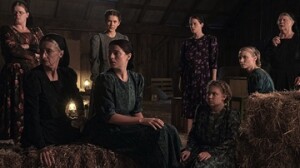 ‘Women Talking is so unique that we can declare we’ve not seen anything like it in a very long time.
‘Women Talking is so unique that we can declare we’ve not seen anything like it in a very long time.
 ‘Women Talking is so unique that we can declare we’ve not seen anything like it in a very long time.
‘Women Talking is so unique that we can declare we’ve not seen anything like it in a very long time.
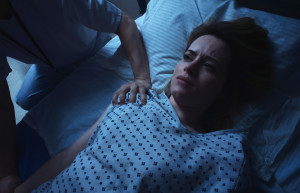
Claire Voy stars as Sawyer Valentini
Is Sawyer Valentini a bit crazy and imagining things or is it all in her head?
Claire Foy (The Crown) plays Valentini, a young successful career woman who had an issue with a stalker years ago. But it’s all behind her now. She’s focused on her career (though her creepy boss offers to take her out of town on a business trip), and just basically getting on with her life.
She goes to see a mental health counselor for a checkup but soon enough, strangely, she is committed against her will in a mental hospital, locked up with people who are all certifiably crazy, so surely why is she locked up with them when of course she is not crazy. She gets a hold of her mother who tries to get her out, but to no avail. Could this be a scam the hospital is involved in just to get her insurance money? But then Valentini recognizes one of the staff who was, or perhaps wasn’t, her stalker. ‘Unsane’ takes us through Valentini’s nightmare experience in the mental hospital and her quest to escape the unjustice, and possibly the stalker, that she is currently facing.
Director Steven Soderbergh in 2013 announced that he was retiring from filmmaking, but ‘Unsane’ marks his second go since then as director (last year’s successful ‘Logan Lucky’ was his ‘return’). ‘Unsane,’ which was shot on an iphone (just like the huge hit ’Tangerine’) is a strange choice for Soderbergh, as he made many successful and award-winning films early on in his career. While ‘Unsane’ won’t be winning any awards, and as the second half spirals a bit out of control relegating it to ‘B’ movie status, it’s still a scary pyschological thriller that will leave you on the edge of your sit with a nail-biting performance by Foy.
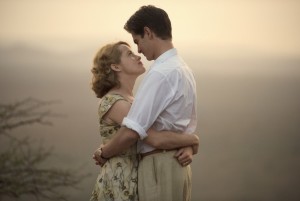 Actor Andy Serkis and his producing partner Jonathan Cavendish set up Imaginarium Productions to make their own films. They were looking for stories and realized that right under their noses was a remarkable and true story that was original and heartfelt. It was the story of Cavendish’s parents.
Actor Andy Serkis and his producing partner Jonathan Cavendish set up Imaginarium Productions to make their own films. They were looking for stories and realized that right under their noses was a remarkable and true story that was original and heartfelt. It was the story of Cavendish’s parents.

Actor Andy Serkis and his producing partner Jonathan Cavendish set up Imaginarium Productions to make their own films. They were looking for stories and realized that right under their noses was a remarkable and true story that was original and heartfelt. It was the story of Cavendish’s parents.
Cavendish’s father, Robin, was paralyzed from the neck down by polio at the age of 28. And his wife, Diana, took it upon herself to take care of him for the rest of his life. And from this we get the movie ‘Breathe.’ Directed by Serkis with a script written by William Nicholson, it was in 1956 when Robin (played by Andrew Garfield) met and married Diana (Claire Foy). But two years later Robin was struck down by polio, right in the prime of his life. A successful tea-broking businessman, his diagnosis, which included an inability to breathe on his own, was only three months. It was a diagnosis that would, of course, dramatically change his and his wife’s life.
Bed bound in the hospital, hooked up to a breathing machine, Diana had the choice to leave him there for the rest of his expected short life, or to take him home and care for him there. She took him home. So ‘Breathe’ is the story of the love and care that Diana had for Robin, through their many years of life, happily as a couple, which produced a son (Jonathan, in 1959). ‘Breathe’ also highlights Robin’s tenacity and ambitiousness to invent, along with Teddy Hall (Hugh Bonneville), a wheelchair with a built-in respirator that would be used for other people in his condition as well.
It may seem like a bit of deja vu watching this film as it’s a bit similar in storyline to ‘The Theory of Everything’ – the film that won Eddie Redmayne an Academy Award for portraying Stephen Hawking, who was also (and still is) confined to a wheelchair for most of his adult life. But ‘Beathe’ doesn’t really have a lot more to offer than ‘Theory,’ and while it’s a beautiful and romantic story abut a man who overcame severe health hurdles to live up until the age of 64 (he died in 1994), it’s a bit on the bland and unexciting side. Garfield is very good as Robin, though he doesn’t really have a whole lot to do except to lie down or sit on a wheelchair (Redmayne did it so much better), and Foy, as Diana, is too much of a knight is shining armour whose character comes across as too chirpy and happy and smiling in a role that would make Florence Nightingale blush – it’s a bit hard to believe that she didn’t suffer somewhat from her giving up her life to take care of Robin (and it’s also very noticeable that Foy’s Diana doesn’t age much in the film, could be it be because the real Diana is very much alive and Jonathan didn’t want to portray her as getting older?). The tagline for this film is ‘With her Love he Lived,’ and while this is very true, it’s a film that holds it’s breathe a bit too long and hard.

The 61st BFI London Film Festival in partnership with American Express® launched tonight with the Opening Night Gala, the European premiere of “Breathe,” directed by Andy Serkis and starring Claire Foy and Andrew Garfield.
Joining Serkis, Foy and Garfield on the red carpet, and on stage before the screening, included co-starts Tom Hollander and Hugh Bonneville.
“Breathe” is an inspirational love story about a couple who defy the odds and try to live a normal life. When dapper and adventurous Robin Cavendish (Garfield) meets self-assured Diana (Foy) at a cricket match, a whirlwind romance ensues. Soon after their wedding, they set out for Nairobi where Robin works as a tea broker. But their new life together takes an abrupt turn when he contracts polio and is given only weeks to live. Determined that her husband’s life should not be restricted by medical and social prejudice, Diana ignores all advice and breaks him out of the hospital. With the support of her twin brothers (both played by Tom Hollander) and friend Teddy (Hugh Bonneville), an Oxford professor who invents a wheelchair with a respirator attached, Diana creates an environment in which Robin can thrive and he goes on to lead a long and full life. “Breathe” is based on the true story of producer Jonathan Cavendish’s parents. “Breathe” is released nationally in the UK on October 27, 2017.
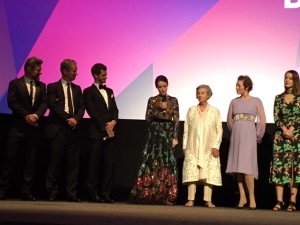
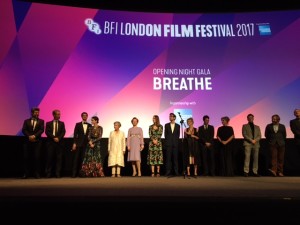


“Breathe” Producer John Cavendish, Claire Foy, Andrew Garfield, Director Andy Serkis, Writer William Nicholson and moderator Terri White at today’s press conference before the film premiere
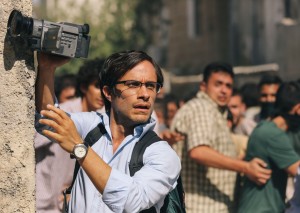 Iranian-born London journalist Maziar Bahari appeared in a skit on Jon Stewart’s The Daily Show discussing spies. It was a skit that, a week later, would end in Bahari’s arrest by the Iranian authorities. His story is told in the new film Rosewater.
Iranian-born London journalist Maziar Bahari appeared in a skit on Jon Stewart’s The Daily Show discussing spies. It was a skit that, a week later, would end in Bahari’s arrest by the Iranian authorities. His story is told in the new film Rosewater.
Bahari (played by Gael Garcia Bernal), was in Iran covering the 2009 election when he was interviewed by The Daily Show’s Jason Jones (who was dressed up as a spy). The interview, which took place in Tehran, was in The Daily Show’s comedic style of acerbic wit. In it Jones and Bahari discussed spies in Iran, and unfortunately the interview was seen by the Iranian authorities. Bahari was later arrested and imprisoned for 118 days, between June and October 2009.
Stewart, who has never written or directed a motion picture before (he wrote and directed Rosewater), has hosted The Daily Show since 1999. Stewart has written books, produced other television shows, and has hosted the Grammy and Academy Awards. But what made him want to venture into unchartered territory to write and direct his first motion picture? Perhaps he was feeling very guilty about Bahari’s arrest and imprisonment. Whatever the reason, Rosewater is a very good debut into the film world for Stewart.
In the beginning of Rosewater, we see Bahari in his London home being very affectionate to his pregnant wife Paola (Claire Foy). As a journalist, he’s about to go to Tehran to cover Iran’s 2009 election. He’s sent there by Newsweek, and since he is part Iranian, it’s a natural choice for him to go. On a fluke, he’s interviewed by The Daily Show, which leads to the drastic consequences. A week later, at his family’s home, he is arrested and sent to a Tehran prison where he is interrogated non-stop by a man who doesn’t give his name, but the movie calls him Rosewater (played by Kim Bodnia) because, according to the real Bahari, he smelled of Rosewater. Bahari is interrogated daily, Rosewater wants to know names of spies as he (and the government) is convinced that Bahari is not who he says he is – a journalist. So the film Rosewater focuses mostly on Bahari’s imprisonment, where he’s blindfolded, tortured, threatened with execution, and ordered to confess to being a spy on television. It’s disturbing to see Bahari getting beaten up – it’s almost a sure thing that he will never make it out of the Iranian prison system. But after 118 days, he is released, and he heads back to London to be with his wife and new baby. It’s, however, an anti-climactic ending as we are robbed of any emotional released-from-prison scenes – it’s just Bahari out of prison and on a plane back to London.
Garcia Bernal is a perfect choice to portray Bahari. Even though he is Mexican, he looks a bit Iranian – so the story is totally believable. It’s a role that most actors would’ve loved to play, but Garcia runs with it. But it’s not Garcia’s movie, it’s Stewart’s movie. He took 12 weeks off from The Daily Show to shoot the film, and it’s an impressive debut. Rosewater is dramatic, taut, well written and directed. And though the ending is a bit of a letdown (perhaps this is how Bahari wanted his release to be portrayed – quietly – as he still has family members who live in Tehran). But that’s a minor quibble for a film that tells a real life nightmare of a story of what one journalist went through when he was just doing his job.






